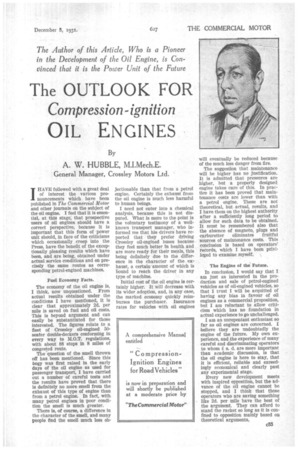The OUTLOOK FOR
Page 57

If you've noticed an error in this article please click here to report it so we can fix it.
Compression-ignition
OIL ENGINES
By A. W. HUBBLE, M.I.Mech.E. General Manager, Crossley Motors Ltd.
The Author of this Article, Who is a Pioneer in the Development of the Oil Engine, is Convinced that it is the Power Unit of the Future IHAVE followed with a great deal of interest the various pronouncements which have been published in The Commercial Motor and other journals on the subject of the oil engine. I feel that it is essential, at this stage; that prospective users of oil engines should have a correct perspeetiva, because It is important that this form of power unit should, in face of the criticisms which occasionally creep into the Press, have the benefit of the exceptionally pleasing results which have been, and are being, obtained under actual service conditions and on precisely the same routes as corresponding petrol-engined machines.
Fuel Economy Facts.
The economy of the oil engine is, I think, now unquestioned. From actual results obtained under the conditions I have mentioned, it is clear that approximately 2d. per mile is saved on fuel and oil costs. This is beyond argument and can easily be substantiated for those interested. The figures relate to a fleet of Crossley oll-engined 50seater double-deckers conforming in every way to M.O.T. regulations, with about 88 stops in 8 miles of congested route.
The question of the smell thrown off has been mentioned. Since this bogy was first raised in the early days of the oil engine as used for passenger transport, I have carried out a number of careful tests and the results have proved that there is definitely no more smell from the exhaust of this type of engine than from a petrol engine. In fact, with many petrol engines in poor condition the smell is much greater.
There is, of course, a difference in the character of the smell, and many people find the smell much less oh jectionable than that from a petrol engine. Certainly the exhaust from the oil engine is much less harmful to human beings.
I need not enter into a chemical analysis, because this is not disputed. What is more to the point is the voluntary testimony of a wellknown transport manager, who informed me that his drivers have reported that they prefer driving Crossley oil-engined buses because they feel much better in health and are more ready for their meals, this being definitely due to the difference in the character of the exhaust, a certain e amount of which is bound to reach the driver in any type of machine.
Initial cost of the oil engine is certainly higher. It will decrease with its wider adoption, and, in any case, the marked economy quickly reimburses the purchaser. Insurance rates for vehicles with oil engines will eventually be reduced because of the much less danger from fire.
The suggestion that maintenance will be higher has no justification. It is admitted that pressures are higher, hut a properly designed engine takes care of this. In practice it has been proved that maintenance costs are lower than with a petrol engine. These are not theoretical, but actual, results, and I have them on the highest authority after a sufficiently long period to allow for such data to be obtained. It must be remembered also that the absence of magneto, plugs and carburetter eliminates fruitful sources of maintenance costs. This conclusion is based on operators' records, which I have been privileged to examine myself.
The Engine of the Future.
In conclusion, I would say that I am just as interested in the production and sale of petrol-engined vehicles as of oil-engined vehicles, so that I trust I will be acquitted of having any bias in favour of oil engines as a commercial proposition, but I am reluctant to allow criticism which has no foundation in actual experience to go unchallenged.
I am an unrepentant enthusiast so far as oil engines are concerned. believe they are undoubtedly the engine of the future. My own experience, and the experience of many careful and discriminating operators to whom s. d. are more important than academic discussion, is that the oil engine is here to stay, that it is efficient, reliable and exceedingly economical and clearly past any experimental stage.
Every new development meets with inspired opposition, but the advance of the oil engine cannot be stopped, and I think that those operators who are saving something like 2d. per mile have the best of the argument. They can afford to stand the racket so long as it is confined to opposition mainly based on theoretical arguments.














































































































